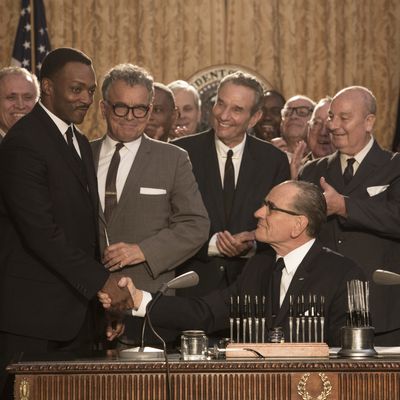
ItÔÇÖs been a while since I saw a TV movie that had everything going for it, yet failed to be memorable. All the Way should have been a classic: electrifying, surprising, moving, artful. ItÔÇÖs not. ItÔÇÖs the kind of film thatÔÇÖs admirable in every detail but that lacks an ineffable spark; everyone involved is committed, serious, faithful. But the result is the equivalent of a note-and-letter-perfect rendition of a song that seems bizarrely oblivious to the music. WhereÔÇÖs the feeling?┬áWhereÔÇÖs the poetry? What happened?
Robert SchenkkanÔÇÖs Tony-winning Broadway drama about President Lyndon Baines JohnsonÔÇÖs attempt to pass the Civil Rights Act of 1964 and attain re-election after John F. KennedyÔÇÖs death was boisterous and intelligent onstage ÔÇö not a great play or a great production, but so engaging and thoughtful that it seemed churlish to complain about what┬áwasnÔÇÖt there. Bryan CranstonÔÇÖs live-wire rendition of Johnson was just right for the medium: as disreputable and colorful and LBJ himself. He was so right as a larger-than-life man, practically a caricature of himself, that his makeup,┬áwhile excellent, didnÔÇÖt have to carry┬áthe┬áweight of conviction, because the┬átext and CranstonÔÇÖs life force did that.┬áThe production also found ingenious ways to show legislative arm-twisting and back-room skulduggery unfolding in different┬álocations without falsifying mundane details, such as the fact that key┬áparticipants were┬átalking on the phone or communicating through underlings or via letter rather than┬ádealing with each other face-to-face.┬áIn┬ámany scenes, the staging and lighting created the theatrical equivalent of┬ásplit-screen compositions in a movie. And┬áthere were moments┬áwhere┬áCranston and his costars put across┬ásubtle human moments by letting the most basic theatrical devices ÔÇö such as spotlit monologues or silent moments of doubt ÔÇö bring you deep inside a characterÔÇÖs personality.
Director Jay RoachÔÇÖs HBO adaptation demonstrates no such ingenuity. ItÔÇÖs unfortunate proof that burning money without imagination can generate nothing but smoke. The praise that many of my colleagues┬áhave lavished on it baffles me: The cable networkÔÇÖs generous approach to┬áproduction values permits theatrical suggestion to be replaced here with scale.
The recreation of the 1964 Democratic convention, for example, is impressive in its thoroughness: In its opening┬ámoments, Johnson moves through throngs of extras, brushes past his┬árunning mate, Hubert Humphrey (Bradley Whitford, wearing a skullcap and beetle eyebrows). The camera leans back to follow Johnson as he and his wife, Lady Bird (Melissa Leo), ascend the stage to accept the partyÔÇÖs nomination, their bodies almost silhouetted by a spotlight hanging┬áfrom the rafters; a giant Citizen KaneÔÇôstyle black-and-white photo of Cranston-as-LBJ hangs behind the lectern. As the president looks out over what looks to be thousands of┬ádelegates holding signs and┬áballoons, their outlines disappearing into a mist of cigarette smoke, you get a sense of how big this movie is (or appears to be), and itÔÇÖs hard┬ánot to┬áappreciate all the work that went┬áinto every frame.
But aside from admiration for the completeness of the moment itÔÇÖs hard to feel much of┬áanything, because this movie has replaced the idea of LBJ with an uncanny photorealistic facsimile of LBJ ÔÇö a prosthetically spot-on approximation of the drawling,┬áglad-handing president,┬áreproduced┬áright┬ádown to the cauliflower ears and dangling earlobes ÔÇö and done more or less the same miracle, or anti-miracle, with the production itself. ItÔÇÖs not a tradeoff worth making. All the Way feels embalmed by all the wrong kinds of fidelity. The film version of CranstonÔÇÖs LBJ only comes to life when heÔÇÖs┬álistening to other characters or silently brooding to himself (while┬ávoice-over narration articulates his fears and doubts); otherwise heÔÇÖs a Madam TussaudÔÇÖs waxworks LBJ that can move and speak, a testament to┬álatex craftsmanship and the careful study of newsreels. The bigger his LBJ is in this film, the less credible and interesting he is. Roach seems to realize this in┬áscenes where LBJ rants and raves, holds court and gesticulates, because you see the camera pulling back, practically putting a┬áproscenium arch around the action,┬ábut no matter┬áhow far back he goes, itÔÇÖs never far enough.
The Reverend Dr. Martin Luther King, Jr. (Anthony Mackie), with whom LBJ spars over civil rights, has been brought to life with just as much attention paid to fine points, but this, too, is a tactical mistake. MackieÔÇÖs posture and intonation, his searching and slightly baleful stare,┬áhis┬áhaircut, his suits, are all just about right. But Mackie and Whitford and Cranston ÔÇö and Leo, whoÔÇÖs close-but-no-cigar as Lady Bird ÔÇö consistently nail the lyrics here, but miss the music. Daniel Day-Lewis in Lincoln, Anthony Hopkins as Tricky Dick in Nixon, Bruce Greenwood as JFK in Thirteen Days, David Oyelowo as King in Selma,┬áwere┬ásuperficially,┬áeven thoroughly┬áconvincing in┬áterms of look and┬ávoice, but they had presences, which is more important; they didnÔÇÖt seem like great Saturday Night Live impersonations dropped into a dramatic context.
In nearly every scene your attention wanders to something other than the essence of human interaction: the way Cranston sucks in his lips like a man anticipating future tooth troubles before he cracks a joke or needles a conversation-mate; the unbroken line of lights around the Oval Office set; the fact that the amphibious car that LBJ drives across a river at his Texas ranch is real, not a special effect. It all amounts to the most honorable kind of shame,┬ábecause the story of the┬ácontentious relationship between MLK and LBJ ÔÇö depicted somewhat controversially in Selma, but not all that differently from the way itÔÇÖs envisioned here ÔÇö is a gold mine of observation about the American character. King and Johnson are magnificent characters in their own rights, fascinating even in inferior films, plays and TV productions, and they also serve as handy real-world metaphors for real-life viewpoints on race┬árelations: KingÔÇÖs nagging revolutionary passion constantly goosing the presidentÔÇÖs earnest white Southern liberalism to be more daring.
What a classic this could have been. What a misfire it is. Too bad.


